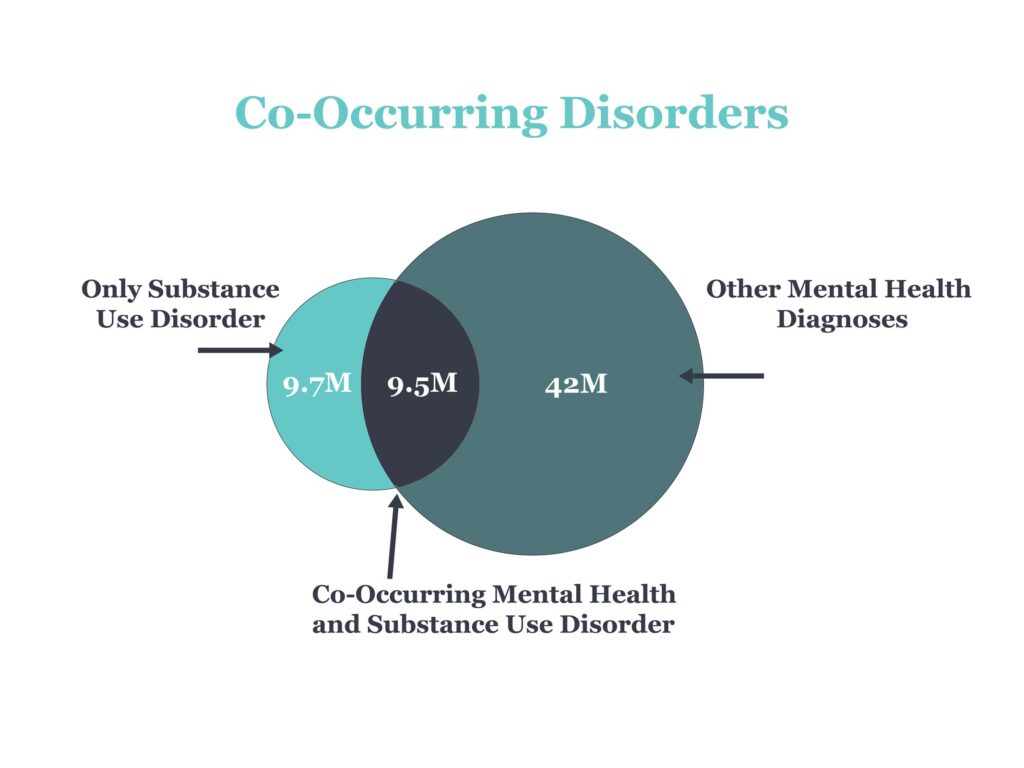Currently there are 9.5 Million Americans who have been diagnosed with co-occurring mental health and substance use disorders. Making up over half of the 20 Million individuals with a known substance use disorder, co-occurring disorders are a common experience within this community. While these disorders are often intertwined with one another, this does not indicate that one caused the other. While they are not causal, individuals with a mental health disorder are at a higher risk of developing a substance use disorder. Knowing this, it is important to understand how these disorders can contribute to one another, and how this can be seen in individuals with co-occurring mental diagnoses. In this post we’ll define “co-occurring”, and discuss how individuals with a co-occurring mental health and substance use diagnoses can understand the coexistence of these disorders within their own lives.
What is Co-Occurring?
The coexistence of a mental disorder and substance use disorder is referred to as a co-occurring disorder (SAMHSA). This is a common occurrence for individuals in treatment – see below.

Below are some of the most common mental health disorders seen in substance use disorder treatment:
- Anxiety and mood disorders
- Schizophrenia
- Bipolar disorder
- Major depressive disorder
- Conduct disorders
- Post-traumatic stress disorder
- Attention deficit hyperactivity disorder
If you suffer from one or more of the above mentioned mental health disorders, you may have an increased likelihood of misusing the following substances:
- Alcohol
- Tobacco
- Opioids
- Stimulants
- Marijuana
- Hallucinogens
- Prescription drugs
For more information on common co-occurring disorders, see the full report on the connection between substance use disorders and mental health disorders here.
Because of the likelihood of co-occurring disorders within the substance use disorder community, it is absolutely necessary to incorporate a comprehensive care plan that takes a whole-person approach. For example, an individual with a co-occurring disorder may consider a comprehensive care team. It could include a licensed therapist, psychiatrist, peer recovery specialist and a program manager. Having an integrated care team is conducive to your success in recovery, keep reading to learn why this is important.
Why It’s Important to Understand Co-Occurring Disorders
If you have been diagnosed with a co-occurring disorder, it’s critical that you approach treatment with this in mind. Identifying triggers and learning new healthy ways to cope is a huge part of living a fulfilling life in recovery. If you suffer from a mental health disorder, you will need to assess how your triggers are rooted in this disorder as well as your substance misuse.
Say you are someone who struggles with anxiety disorder, and you are currently in treatment for alcohol use disorder (AUD), it’s important that you work with a licensed professional to determine whether your anxiety contributes to your history of alcohol misuse. Was this misuse a coping mechanism that you relied on? Did your anxiety drive your alcohol misuse? During periods that you experienced heightened anxiety did you notice increased misuse of alcohol?
Working alongside your care team, you can investigate these coexisting disorders and learn how to approach treatment in a wholesome way. If one disorder is left untreated, you may have difficulty achieving long-term success in recovery, so it’s important to address any and all diagnoses you have received.
How are Substance Use Disorders and Mental Health Related?
Individuals with a mental health disorder are at higher risk to develop a substance use disorder (SUD), and it was found that over 60% of adolescents in substance use disorder treatment programs also met criteria for mental health diagnostics (NIDA). High rates of co-occurring disorders in adolescents translates into what we see nationally regarding adults with SUD; substance use disorders and mental health are closely tied.
While it is not a universal experience, it’s common to receive a co-occurring diagnosis while in treatment for SUD. The misuse of substances frequently develops due to an inability to cope with difficult external and internal events. This is often where we see the relationship between substance use and mental health disorders becoming destructive. If both (or all) disorders are compounded from similar events and patterns they need to all be effectively addressed and treated.
What Does This Mean for You?
Understanding co-occurring disorders is the first step in developing a comprehensive treatment plan that works specifically for you. With over half of all individuals with a substance use disorder also meeting criteria for mental health diagnostics, receiving support for both disorders is key to your long-term success. While there are some treatment options that incorporate both mental health and substance misuse treatments, there are many that focus only on addiction recovery. Knowing this, you may need to find external support while working a treatment program. This is one of the many reasons why Kyros is committed to increasing access to recovery resources, including mental wellness. If you are looking for support, keep reading to get in touch with someone who can help you along your journey.
Find Help Now
Peer Providers work one-on-one with individuals in early recovery to guide them through the process of creating a healthy new life. Peers have lived experience of recovery that provides them with the unique toolkit to relate to clients and provide invaluable support. They provide mental health and recovery resources, helping you to find a care team that supports your overall success. Start working with a Peer now and find someone who walks alongside you along your recovery journey!
Sources:
NIH. “Part 1: The Connection Between Substance Use Disorders and Mental Illness.” National Institute of Mental Health, 2020. https://nida.nih.gov/publications/research-reports/common-comorbidities-substance-use-disorders/part-1-connection-between-substance-use-disorders-mental-illness.
Accessed 21 April 2023.
NIH. “Substance Use and Co-Occurring Mental Disorders.” National Institute of Mental Health, 2023. https://www.nimh.nih.gov/health/topics/substance-use-and-mental-health#:~:text=Mental%20disorders%20can%20contribute%20to,a%20form%20of%20self%2Dmedication
Accessed 20 April 2023.
SAMHSA. “Co-Occurring Disorders and Other Health Conditions.” Substance Abuse and Mental Health Services Association, 2023. https://www.samhsa.gov/medications-substance-use-disorders/medications-counseling-related-conditions/co-occurring-disorders.
Accessed 19 April 2023.
SAMHSA. “Key Substance Use and Mental Health Indicators in the United States: Results From the 2019 National Survey on Drug Use and Health.” Substance Abuse and Mental Health Services Association, 2019. https://www.samhsa.gov/data/sites/default/files/reports/rpt29393/2019NSDUHFFRPDFWHTML/2019NSDUHFFR090120.htm#mhisud.
Accessed 20 April 2023.





